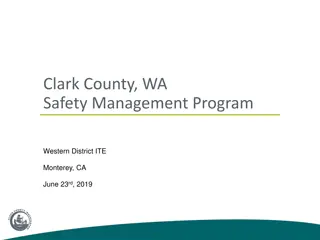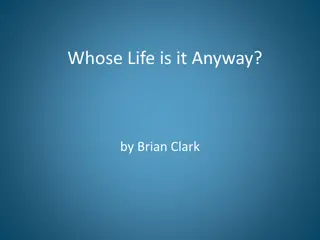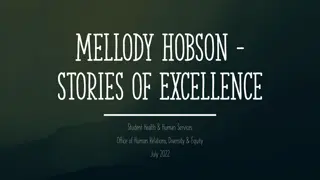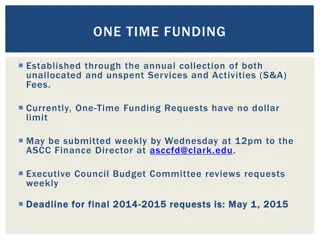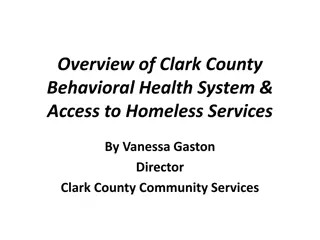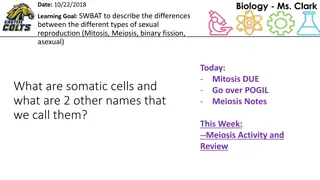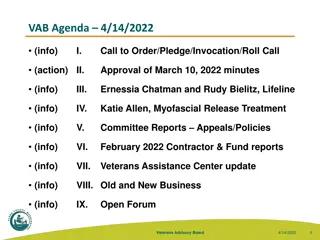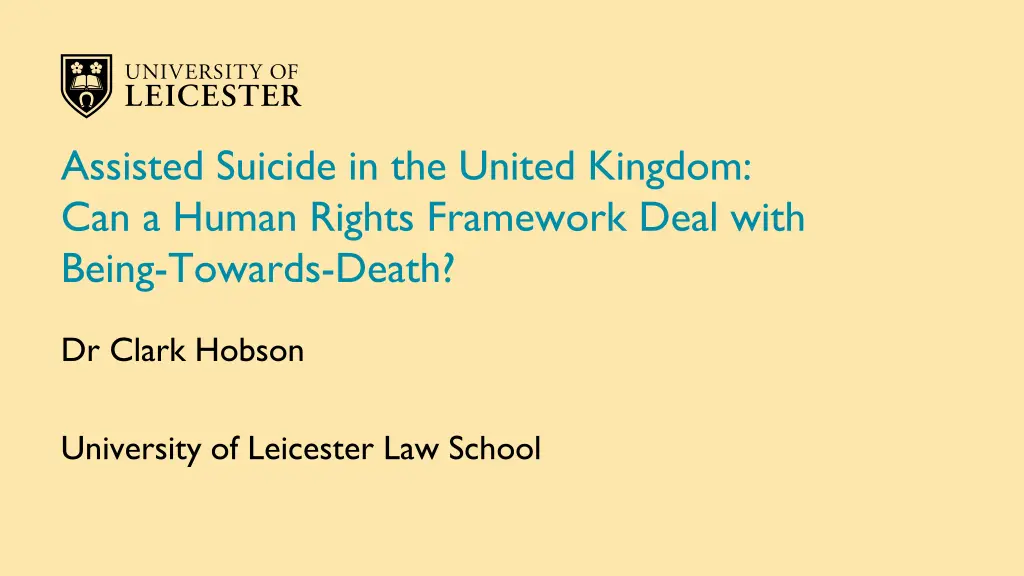
Legal Challenges and Human Rights in Assisted Suicide Laws
Explore the legal challenges surrounding assisted suicide legislation in the UK and how it impacts the experience of death. Delve into existentialist ideas, human rights frameworks, and the dissatisfaction felt by individuals affected by the current legal status.
Download Presentation

Please find below an Image/Link to download the presentation.
The content on the website is provided AS IS for your information and personal use only. It may not be sold, licensed, or shared on other websites without obtaining consent from the author. If you encounter any issues during the download, it is possible that the publisher has removed the file from their server.
You are allowed to download the files provided on this website for personal or commercial use, subject to the condition that they are used lawfully. All files are the property of their respective owners.
The content on the website is provided AS IS for your information and personal use only. It may not be sold, licensed, or shared on other websites without obtaining consent from the author.
E N D
Presentation Transcript
Assisted Suicide in the United Kingdom: Can a Human Rights Framework Deal with Being-Towards-Death? Dr Clark Hobson University of Leicester Law School
Introduction Recent legal challenges to assisted suicide legislation in the United Kingdom show the legal status of assisted suicide has the potential to alter the experience of death. Questions surrounding death, and in particular legal questions surrounding assisted dying, partially constituted by existential categories/ideas.
Introduction Legal frameworks/ethical debates re legalisation of assisted suicide in the United Kingdom have either neglected existentialist ideas or transmuted existentialist ideas into autonomy and value-of-life claims compatible with a human rights framework. Re-address that neglect: does law preclude the freedom to contest the terms in which conflict is cast? Is a human rights framework is still an appropriate, if sub- optimal, method of representing these concerns?
Motivations Noticeable dissatisfaction felt by claimants/appellants regarding the impact of legal status of AS, and litigation, on the appellant s experience of their existence: Thank you - this is keeping me strong and keeps me going but there will come a time when I can no longer tolerate my life and I fear that time is not far off. I want to finish what I have started but it is very hard as I feel that I have no quality of life, my life is grim and miserable and I cannot bear to go on much longer. There is no palliative care that can help me. My life is beyond that so opponents who harp on about palliative care as the answer so not know what they are talking about! (Omid T, 12thupdate! https://www.crowdjustice.com/case/dignified-death/)
Motivations Jurisdictional claim, by courts, to be involved in any future assessment of persons whom should be eligible to avail themselves of assistance to end their own lives Nicklinson v Ministry of Justice [2014] UKSC 38, per Lord Mance [at 186]: The most persuasive case that may be made on behalf of persons in the tragic positions of Mr Nicklinson or Mr Lamb is that they represent a distinct and relatively small group, within which it should be possible to identify in advance by a careful prior review (possibly involving the court as well as medical opinion) those capable of forming a free and informed decision to commit suicide and distinguish them from those who might be vulnerable
Legal Overview S2(1) Suicide Act 1961: universal prohibition: A person commits an offence if they do an act capable of encouraging or assisting the suicide or attempted suicide of another person with intent to encourage or assist. Pretty, Purdy, Nicklinson, Conway, Omid, Newby: s2(1) SA disproportionate interference with Art 8(1) European Convention on Human Rights (as incorporated by Human Rights Act 1998). All failed. Art 8 engaged (right to control timing and manner of own death), but no infringement. Art 8 (1) Everyone has the right to respect for his private and family life, his home and his correspondence. (2) There shall be no interference by a public authority with the exercise of this right except such as is in accordance with the law and is necessary in a democratic society in the interests of national security, public safety or the economic well-being of the country, for the prevention of disorder or crime, for the protection of health or morals, or for the protection of the rights and freedoms of others. Conway v Secretary of State for Justice [2017] EWHC 2447 (at [91]): s2(1) protects weak and vulnerable, SOL and prof-patient trust.
Death & questions surrounding assisted dying, partially constituted by existential categories/ideas Thinking about human existence requires new categories not found within moral theory. A further set of categories, governed by the norm of authenticity is required to fully understand reality, and human existence. Authenticity (& Attitudes towards death) Engagement, Dasein, Being-in-the-world Being-towards-death
Legal status of assisted suicide has the potential to alter the experience of death Pre-litigation, it appears that we can say that assisted suicide litigants have realized authentically Being-towards-death. Nicklinson, Conway and Omid do not just expect death. Anticipate the possibility of their own not-being & attempt to own this. There is also a dispositive sense of anxiety But, no fear here. Post-litigation: symbolic death: [Mr Nicklinson] was heartbroken by the High Court decision that he could not end his life at a time of his choosing with the help of a new doctor. "He could not understand how the legal argument on his behalf could not succeed. [Mr Nicklinson s family solicitor] said Mr Nicklinson had told her two days after the ruling he was "crestfallen, totally devastated and very frightened". He had added: "I fear for the future and the misery it is bound to bring. "I suppose it was wrong of me to invest so much hope and expectation into the judgment but I really believed in the veracity of the argument and quite simply could not understand how anybody could disagree with the logic. "I guess I forgot the emotional component. (BBC News, Right-to-die man Tony Nicklinson dead after refusing food https://www.bbc.com/news/uk-england- 19341722).
Legal frameworks/ethical debates re legalisation of assisted suicide in the United Kingdom have either neglected existentialist ideas or transmuted existentialist ideas into autonomy and value-of-life claims compatible with a human rights framework. Nicklinson v MOJ, per Lord Wilson [at 205]: As a former judge of the Family Division, but with hesitation apt to the absence of submissions in this regard, I identify the following factors which the court might wish to investigate before deciding whether it can be so satisfied: (a) the claimant s capacity to reach a voluntary, clear, settled and informed decision to commit suicide and the existence of any factor which, notwithstanding the requisite capacity, might disable him from reaching such a decision; (b) the nature of his illness, physical incapacity or other physical condition ( the condition ); (c) the aetiology of the condition; (d) its history and the nature of the treatments administered for it; (e) the nature and extent of the care and support with which the condition requires that he be provided; (f) the nature and extent of the pain, of the suffering both physical and psychological and of the disability, which the condition causes to him and the extent to which they can be alleviated; (g) his ability to continue to tolerate them and the reasonableness or otherwise of expecting him to continue to do so; (h) the prognosis for any change in the condition; (i) his expectation of life; (j) his reasons for wishing to commit suicide; (k) the length of time for which he has wished to do so and the consistency of his wish to do so; (l) the nature and extent of his discussions with others, and of the professional advice given to him, about his proposed suicide and all other options for his future
Re-address that neglect: does law preclude the freedom to contest the terms in which conflict is cast? Is a human rights framework is still an appropriate, if sub-optimal, method of representing these concerns? Proportionality exercise to determine if there has been a disproportionate interference with a claimant/appellant s rights. Structured around 4 questions: R (Quila) v Secretary of State for the Home Department [2011] UKSC 45, per Lord Wilson [at 45]: (a) is the legislative objective sufficiently important to justify limiting a fundamental right?; (b) are the measures which have been designed to meet it rationally connected to it?; (c) are they no more than are necessary to accomplish it?; and (d) do they strike a fair balance between the rights of the individual and the interests of the community? A human rights framework: clear structure of the reason-giving in judicial decisions, and the process of searching for, citing, assessing and comparing the weight of these reasons.







